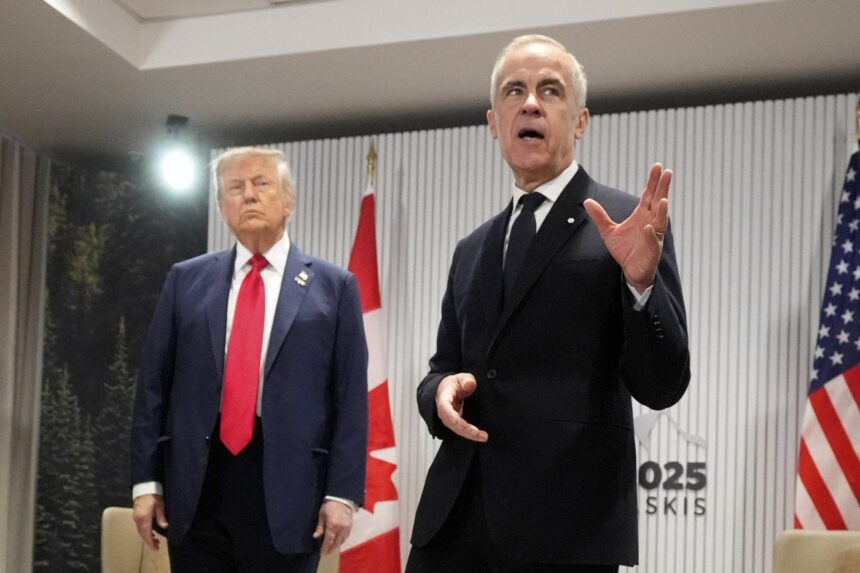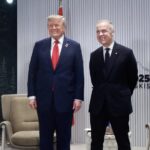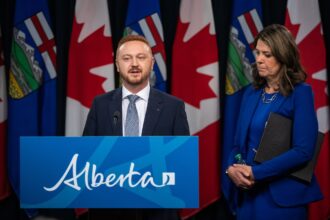In a stunning development that has sent ripples through North American diplomatic channels, Finance Minister Mark Carney revealed today that President Donald Trump’s administration has expressed interest in finalizing a comprehensive economic security agreement with Canada within an ambitious 30-day timeframe. This unexpected acceleration comes just weeks after Trump’s return to the White House, signaling a dramatic shift in Canada-U.S. relations that could reshape trade dynamics across the continent.
“The message from Washington has been unambiguous,” Carney stated during an emergency press briefing in Ottawa. “President Trump has directed his team to prioritize what he’s calling a ‘total economic security package’ with Canada, with the explicit goal of finalizing terms before August.”
The proposed agreement would span multiple sectors including energy, critical minerals, manufacturing, and defense production. According to senior government sources, preliminary discussions have already begun through diplomatic back-channels, with U.S. Trade Representative nominees making initial contact with Canadian officials last week.
Trump’s renewed focus on Canada represents a marked departure from his previous administration’s often contentious approach to bilateral relations. Economic analysts suggest this pivot likely stems from growing concerns about economic competition with China and a desire to secure North American supply chains.
“What we’re seeing is the practical application of Trump’s ‘America First 2.0’ strategy,” explains Dr. Eleanor Westbrook, Director of the North American Trade Institute. “By strengthening economic ties with Canada, particularly in critical minerals and energy, the U.S. gains strategic advantages in its ongoing economic competition with Beijing.”
The proposed deal would reportedly include provisions for coordinated critical mineral extraction and processing, expanded energy cooperation, and harmonized regulatory frameworks for emerging technologies. Sources within the Prime Minister’s Office indicate that Canadian negotiators have been instructed to prioritize protections for Canadian sovereignty while pursuing mutually beneficial terms.
Perhaps most surprising is the expedited timeline. Former Canadian ambassador to the United States David MacNaughton called the 30-day target “extraordinarily ambitious” and “potentially problematic” given the complexity of such negotiations. “These agreements typically require months, if not years, of careful negotiation. Rushing through terms could lead to unfavorable outcomes for Canada,” MacNaughton warned.
For his part, Carney has emphasized that while Canada welcomes renewed economic engagement with its largest trading partner, any agreement must reflect Canadian interests and values. “We will not sacrifice Canadian sovereignty or environmental standards for the sake of meeting an arbitrary deadline,” Carney asserted, while acknowledging the strategic importance of maintaining strong economic ties with the United States.
Business leaders across Canada have expressed cautious optimism about the potential deal. The Canadian Chamber of Commerce has already established a special task force to advise the government on negotiation priorities, with particular focus on protecting Canadian manufacturers from potential “Buy American” provisions.
Political analysts note that the government faces a delicate balancing act. “The Prime Minister needs to demonstrate he can effectively work with Trump while not appearing subservient to American interests,” notes political strategist Margaret Wente. “It’s a challenging diplomatic dance with significant political consequences.”
As bilateral discussions accelerate, questions remain about how this agreement might impact Canada’s other international trade relationships, particularly with European and Indo-Pacific partners. Trade experts caution that provisions in a new U.S. agreement could potentially conflict with Canada’s obligations under CPTPP or create complications in ongoing negotiations with other trading blocs.
The proposed economic security agreement represents the first major test of Canada-U.S. relations in Trump’s second term. As negotiations unfold in the coming weeks, Canadians will be watching closely to see whether this renewed engagement signals a more cooperative approach to bilateral relations or the beginning of another turbulent chapter in North American economic diplomacy. Will Canada successfully navigate these accelerated negotiations while protecting its essential economic interests, or will the pressure to deliver a quick agreement result in long-term compromises that Canadians might later regret?

























